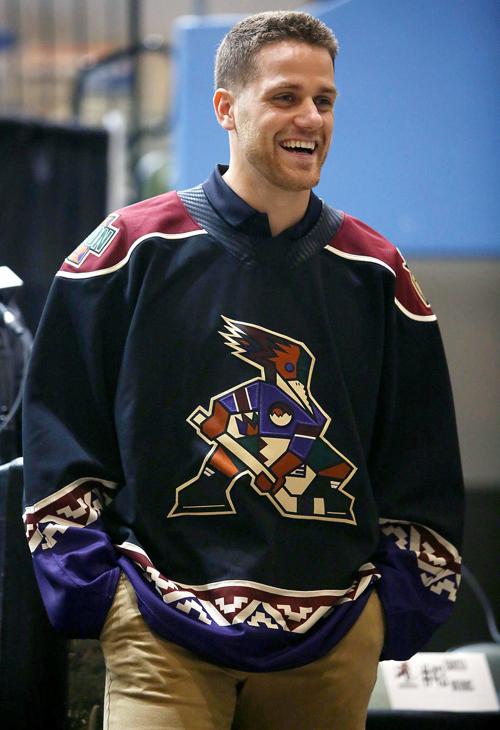It’s been two weeks since the American Hockey League’s Tucson Roadrunners finished a single goal away from earning a second Calder Cup playoff berth in its third Southern Arizona season.
Don’t expect Tucson captain Dakota Mermis to get over it any time soon.
“It still stings. I’ve never been on a team where it’s come down to the third period of the last game of the season like that,” said Mermis, who has played with the organization dating back its days as the Springfield (Mass.) Falcons. “You can’t help but look and think ‘Man that should be us playing tonight, like we planned on.’ … It’s a weird feeling.”
Mermis, who with his wife, Sarah, just bought a house near their hometown of St. Louis to settle down in the offseason, said he’s both ready to recharge this summer, but also wishes next season was already here. The 25-year-old is eager to play again following the disappointing end to the 2018-19 season.
It’s happen soon enough — or maybe not at all.
The defenseman is one of a number of free agents coming off contracts with the AHL’s Roadrunners or NHL’s Arizona Coyotes.
“You just don’t know this time of year,” Mermis said of whether he expects to be back in Tucson in the fall.
How the organization — from Glendale to Tucson and back — plans to handle possible departures of locker room leaders like Mermis and fellow defenseman Robbie Russo and how it will manage a deep corps of goaltenders are just two of a number of key questions looming this summer offseason:
1. How will the Roadrunners fare while dancing the free-agent tango?
Mermis’ impact has never been about scoring prowess. The stability he brings to the blueline and what he brings to the locker room in terms of mindset, leadership and calmness is why he has been so valuable the past few seasons.
But Mermis and Russo — whose 39 points from the blueline were third-best overall for Tucson — are both unrestricted free agents this year, meaning a return is up in the air. So is David Ullstrom, who is a top scorer when healthy.
Restricted free agents include Michael Bunting (19 goals and 41 points), Hudson Fasching (16 goals, 33 points), former AHL All-Star Emil Petterson and four-year stalwart Dysin Mayo, as well as the goaltending tandem of Adin Hill and Hunter Miska.
While it would be a surprise if Bunting and Hill aren’t back to join under-contract names like leading goal- and point-scorer Lane Pederson, the annual free agency dance is the ultimate arbiter to determining how the Roadrunners look when they return to Tucson Arena again this October.
2. Where do the Roadrunners fit on the Coyotes’ goaltending carousel?
Hill, called-up to the NHL back in November, proved he can play at the game’s highest level.
In his first three games with the Coyotes, Hill stopped 59 of 60 shots, posting a 3-0-0 record, a 0.43 goals-against average and a shutout to earn the NHL’s Second Star of the Week honors for the week ending Dec. 2. He stayed with the Coyotes into January, before returning to Tucson and backstopping the Roadrunners’ resurgence into playoff contention.
What’s this mean heading into 2019-20? If the Coyotes hold on to both Antii Raanta and Darcy Kuemper for 2019-20, Hill will likely spend at least another season at the AHL level. But deeper in the organization, there’s Merrick Madsen, who spent much of the year with the ECHL’s Norfolk Admirals despite a hot start of his own during call-up duty in Tucson. There’s also recent signee Erik Källgren of Sweden.
Roadrunners fans will notice one name conspicuously left off the above list: Miska, who despite splitting time virtually down the middle with Hill for a season and a half, was barely used at all down the stretch for the Roadrunners.
Miska and Hill are both restricted free agents. If the Coyotes have to choose to keep one in the pipeline, it will be Hill. Keeping Miska would mean risking a logjam with Madsen and Källgren, should the rest of the organization’s netminders stay healthy.
3. How will the Roadrunners react to having a coach return for his second season?
Perhaps the most important returnee to the Roadrunners roster isn’t actually on the Roadrunners’ roster.
Varady spent 2018-19 as the third head coach in the franchise’s three seasons in the desert. He will return next season, and so will his staff.
“Jay has a way of showing up to the rink – and the assistant coaches are included in that — and they really are able to inspire you in an exciting way that makes you want to the work … for yourself but also for the team,” Mermis said. “And they keep it fun. Certainly there are moments that are more serious, but no matter what is going on, you can talk to those guys about hockey, life. It just gives you a fresh take of coming to the rink and knowing they’re there totally for you and want the best for you.”





